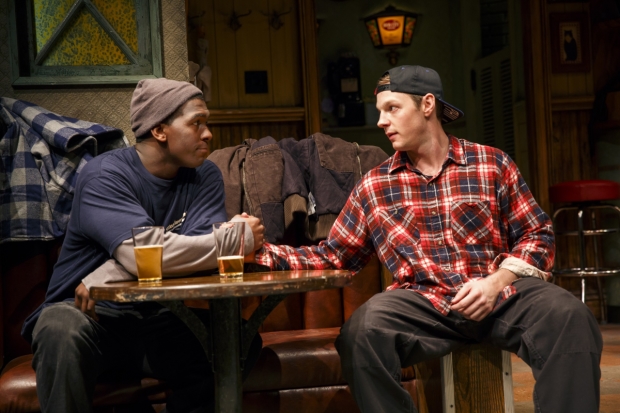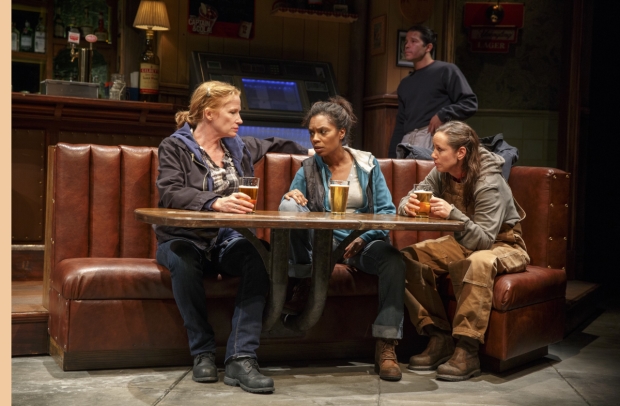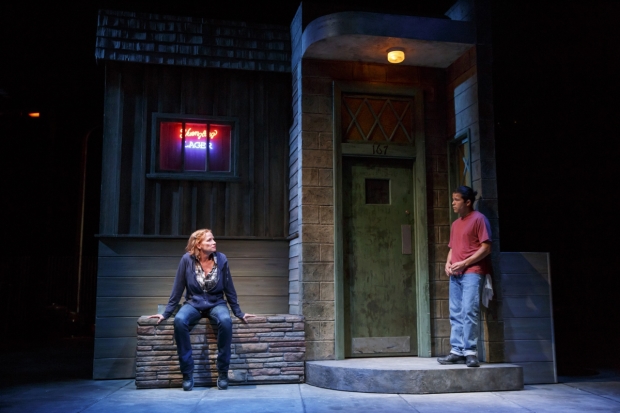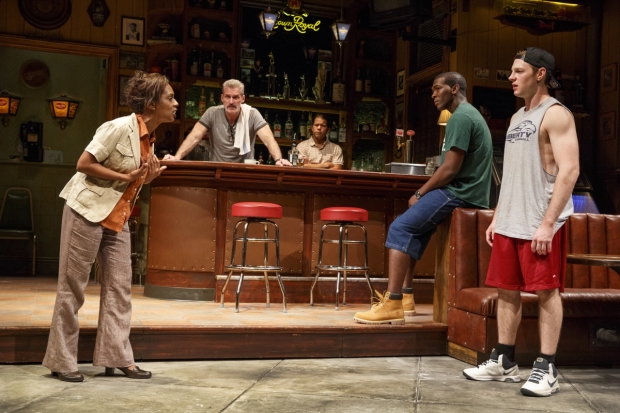Sweat

(© Joan Marcus)
A white man and a black man sit facing the audience with a parole officer between them in the opening scene of Lynn Nottage's Sweat, which is now making its electrifying New York debut at the Public Theater. The black man carries a pocket Bible, while the white man sports a scowl and a white-power cross on his neck. They used to be inseparable, but a terrible incident changed that, landing them both in prison for the last eight years (roughly, the entirety of the George W. Bush administration). Their hometown of Reading, Pennsylvania, has drastically changed in that time. Even when they're released from jail, neither of them truly feels like they are going home.
In Sweat, Nottage (who won the 2009 Pulitzer Prize for Ruined) sensitively unwraps just how this disaster happened. It's the tragically familiar story of a solid working-class community upended by globalization, greed, addiction, and violence. Nottage has crafted a microcosm of the recent past, showing just how fragile that ecosystem was. It ought to be required viewing for all Americans.

(© Joan Marcus)
Most of the action takes place in the year 2000 (as evidenced by the wail of Carlos Santana's guitar in Rob Milburn and Michael Bodeen's period sound design): Cynthia (Michelle Wilson), Tracey (Johanna Day), and Jessie (Miriam Shor) work hard all day on the assembly line at the Olstead factory, where they earn a decent union wage. After work, they like to drink at their favorite watering hole where Stan (James Colby) tends bar. Stan used to work at the factory too, until an injury sidelined him. All of them come from Olstead legacy families with Cynthia's son, Chris (Khris Davis), and Tracey's son, Jason (Will Pullen), also taking jobs there. When the company looks to hire a new manager from off the production floor, Cynthia sees her opportunity to trade in her blue collar for a white one.
"I betcha they wanted a minority," Tracey opines when Cynthia gets the job over her. "I'm not prejudice, but that's how things are going these days." She tells this to Oscar (Carlo Albán), the Colombian-American barback who happens to be holding an employment listing (in Spanish) for new jobs at the plant. Tracey insists it must be some kind of joke since the factory is a closed shop and always has been: "You gotta know somebody to get in." But Oscar was born in Reading and knows all the workers who frequent the bar, so why can't he get in?

(© Joan Marcus)
Better than any playwright who has dealt with the subject in this century, Nottage delicately unpacks the interplay of race and class in American society. She shows just how tribalism and the 20th-century notion of economic justice are intimately related. Like a latter-day Clifford Odets, she also demonstrates how these divisions have been purposefully exploited by the capital-owning class.
Detractors may accuse Nottage of the crime of high contrivance: that the characters and plot twists of Sweat are carefully calibrated to address Nottage's preexisting big issue. This may be the case, but her dramatic voice is so compelling and her characters so authentic that it really doesn't matter. We are inextricably drawn into the play so that, by the heart-pounding climax, we are completely invested.
Much credit goes to Kate Whoriskey for directing an unrelenting production that keeps our eyes glued to the stage. John Lee Beatty's detailed bar set (complete with a believable array of down-market liquors) rotates around to facilitate both interior and exterior scenes. Jennifer Moeller's turn-of-the-century costumes subtly expose the nuances of class that our language often conceals (especially when Cynthia switches to her office drag).
Jeff Sugg's well-curated video design (sometimes projected, but more often played on an old television mounted over the bar) allows us a brief glimpse at the context of the outside world, for those of us who have forgotten that George W. Bush ran as the isolationist populist to Al Gore's jet-setting globalist. U. Jonathan Toppo's terrifying fight choreography keeps us on the edge of our seats as the play hurtles toward its tragic conclusion. All of it is in service to Nottage's text and the actors interpreting it.

(© Joan Marcus)
The performers don't disappoint: Pullen's Jason conveys the frenetic anxiety of a man who doesn't want to be left behind, while the conflict between self-preservation and loyalty rages within Davis' Chris. Colby's Stan is the consummate fatherly bartender. Shor tells a gripping story of her own as her Jessie quietly passes out in a corner of the bar for much of the play. As Cynthia, Michelle Wilson portrays the most immediately sympathetic character, torn between making the best choice for her family and doing right by her friends. Day's Tracey is far more complicated: Part Mama Bear and part Lady Macbeth, our reaction to her oscillates between admiration and disdain. As the mostly silent Oscar, Albán gives the bravest performance of the night: A permanent catch in his voice betrays a mountain of fear, but that never prevents him from speaking up when he needs to.
With an outlook that is multidimensional, endlessly compassionate, and never condescending, Sweat comes as sweet relief to the American theater, which has largely failed to address class issues in a serious way. It also happens to be the best new play of the season. It isn't just the tale of nine people in postindustrial Pennsylvania, but the story of just what happened to the triumphal country we knew in the latter half of the 20th century. Those struggling to understand the rage emanating from the American heartland should start here.










